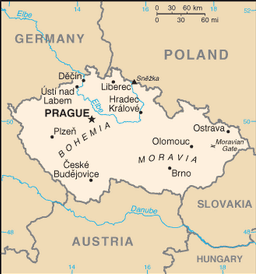Czech republic
 Czech republic is country of Europe located in central Europe.
Czech republic is country of Europe located in central Europe.
Details
| Official Name: | Czech republic |
| Capital: | Prague |
| Total area: | 78 866 km2 |
| GDP per capita: | $27,190 |
| Native Language: | Slovak, German, Polish |
| Government: | Parliamentary republic |
| Population: | 10,513,209 |
| Major Religion: | Irreligion, Roman Catholicism |
| Monetary Unit: | Czech koruna (CZK) |
The Czech Republic became an independent state in January 1993 after Czechoslovakia split into its two constituent parts. Before World War II, Czechoslovakia was one of the 10 most industrialised states in the world, and the only central European country to remain a democracy until 1938.
The Czech capital, Prague, is more than 1 000 years old and has a wealth of historic architecture of different styles. Because of this, the city has become a favoured location for many international film makers.
Manufacturing is still a major economic activity, especially the production of automobiles, machine tools, and engineering products. Iron and steel industries are important in Moravia in the east of the country. The chief crops are maize, sugar beet, potatoes, wheat, barley, and rye.
Hills and mountains cover about 95% of the country – ideal for skiing, mountain biking and hill walking. Wild boar and foxes are found in the abundant woodlands.
The Czech Republic produces world-famous beer, including Pilsner. Wine is produced in the southern regions of Moravia and in part of Bohemia. A record 900 natural springs have also ensured that the country produces plenty of mineral water. Traditional dishes include “ knedlíky ”, a type of dumpling made from potatoes or bread.
Famous Czechs include the Art Nouveau artist Alfons Mucha, composers Antonin Dvorák and Bedrich Smetana, marathon runner Emil Zátopek and the writers Franz Kafka and Milan Kundera.
Health & Welfare
Combination of universal social welfare system and privatization.
Economy & Jobs
Jobs in agriculture, mining, manufacturing, and tourism.
Main Attractions
Prague, Karlovy Vary spa, Křivoklat castle and Moravian Karst hills.
Economy
The Czech Republic possesses a developed, high-income economy with a GDP per capita of 80% of the European Union average. One of the most stable and prosperous of the post-Communist states, the Czech Republic saw growth of over 6% annually in the three years before the outbreak of the recent global economic crisis. Growth has been led by exports to the European Union, especially Germany, and foreign investment, while domestic demand is reviving.
Most of the economy has been privatised, including the banks and telecommunications. The current centre-right government plans to continue with privatisation, including the energy industry and the Prague airport. It has recently agreed to the sale of a 7% stake in the energy producer, CEZ Group, with the sale of the Budějovický Budvar brewery also mooted. A 2009 survey in cooperation with the Czech Economic Association found that the majority of Czech economists favor continued liberalization in most sectors of the economy.
Immigration possibilities
If you are interested in immigration to Czech republic, click here, and also get acquainted with the relevant migration documents.